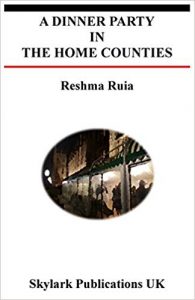A Dinner Party at the Home Counties by Reshma Ruia
Reviewed by Sushumna Kannan
Reshma Ruia’s poems echo the thoughts of nearly everyone in the diaspora. Her title poem is a subtle take on the typical questions directed at one’s identity, not one’s self, at a dinner party. It deals skillfully with the vast array of experiences in the diaspora, especially the patronization and the labeling. And the stereotyping that makes others ask about arranged marriages and stipulates the things the protagonist can and cannot speak of—since the conversation will typically lead to—further exoticization or deprecation or just plain misunderstanding. Ruia shows us why attending a dinner party in the home counties is fine act of balancing!

What is life like in the diaspora, anyway? What is this fuss, you ask. Experts have reflected on various aspects of the question for a few decades now, sweeping English literary studies, at least, with concepts of alienation, split self, nostalgia and hybrid identity. Despite the disciplinization of Diaspora Studies, the experiences of the diasporic appear to have remained tragically unchanged; the people they interact with have no inquisitiveness or have too much of it. Or, perhaps there has been a small shift from Orientalism, i.e., viewing India, for instance, as the land of snake charmers, caste system, elephants, tigers, mosquitoes and of course, the inimitable Kamasutra. For some of the diasporic, life away from homeland is peppered with the excusable chai tea, naan bread and henna tattoo, while for others, it is displacement, loneliness and self-mockery arising from low self-esteem. For some, it is exhausting and exciting simultaneously, while for others, it is home and hell flowing into one another seamlessly.
In the diaspora, it appears, one is always attending an interview—are you following rules, are you highly-skilled, are you dressed appropriately and so on. One must earn one’s place in it notwithstanding the equivalency certificates; they amount to little. There is a sense of betrayal because the promise was of equality and non-discrimination—an elusive thing that never translates into reality. Life in the diaspora for too many of us is, constant contending with ambiguity and muttered phrases that only we can hear but never be sure of hearing. Akin to the men who grope you in crowded places—although this one’s a world-wide phenomenon—stumping you a little every time, no matter how much you practice what to say or do.
Ruia’s poems cover all these different themes of diaspora life but not with half the brazenness of prose with which I have listed them. Instead, her delicate, precise, subdued and muted observations of the everyday unravels exactly how alienation, even assimilation takes place through a series of poetic, resonating and striking images. The book of nearly fifty poems is divided unequally into three sections, Beginnings, The Space Between and Endings. In Beginnings, Ruia explores writing from a male point of view and follows a stream of consciousness method. Her exploration of the convenient excuse for mispronunciations of names is on point. There are inner rhymes and occasional rhymes with little commitment to follow them through the entirety of the poem. Millennials are anyway undecided about rhyme schemes, I think—they love it, they hate it.
Ruia touches upon the violence of partition in “1947,” through a series of impactful images that convey their charm in collage-like scenes. Then there is Mrs. Basu, the deported woman, who contrary to common expectations, is relieved, even happy that she is going back home. Some of the following lines from “Biography” about a mother or her namesake stood out. They are beautiful:
She flings me high as she sings out loud.
Folds her arms, watching me
as I fall.
Ruia takes on the hypocrisy of anti-immigration in “Brexit Blues” and explores the feelings of a mother who has followed her son to the UK next. The mother’s woe is also the tragedy of her son being an MBA in India but driving vans in London for a living. Again, as an expectant mother’s thoughts, the following lines stood out.
You won’t fell me down, my unborn child,
with your love or your blows.
I would read them as emerging from the overwhelming love one feels for one’s child. In the second section, The Space Between, the description of meeting with an old friend is a poem with great flow and apt words. I loved these the best although they must be read within the context of the poem:
The fairy tales she sings to herself.
I forgive them all.
In “The Patient,” Ruia is fairly direct in sketching the experience of being black. There is a sense of immediacy and irreverence in this poem. Ruia uses reported conversations and dialogue with care. She doesn’t restrict herself thematically at all and explores a wide range of thoughts and situations, revealing a complex, sensitive and thinking human being behind her words. I was puzzled by where “Pomology” was going though. Is Ruia mourning the loss of youth? But why? Aging is beautiful too. Especially for those women who are not invested in what others think of them or think of themselves as mere bodies. The poem begins as a critique of the beauty industry but appears to end with nostalgia for youth!
In the final section, Endings, Ruia ruminates on old age, the death of a parent and the like, sneaking lovely little insights on mundane or life-altering events. She offers beautiful observations on powerful themes and shapes her poems variously—monologue, ballad, prayer, conversation. Ruia walks us through her ideas slowly, exploring it in depth, allowing us to savour it. On the whole, a great collection focused on the unfunny predicament of hailing from a colonized, interrupted culture and having to explain oneself a lot, while the colonizer culture somehow has no explaining to do at all.
![]()

Sushumna Kannan is Jaggery Senior Reviews Editor and has a PhD in Cultural Studies from Centre for the Study of Culture and Society, Bangalore, India. Her research on the South Asian devotional traditions and feminist epistemology focused on the medieval saint, Akka Mahadevi and her vachanas. She received the BOURSE MIRA, French research fellowship in 2006 and 2007 and the Sir Ratan Tata fellowship for PhD Coursework and Writing in 2003 and 2007. She has published her research on Bhakti, dharmashastras, ethics



